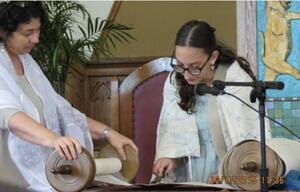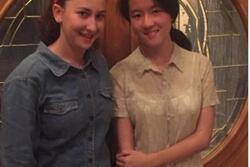Whose Bat Mitzvah Is It Anyway?
Becoming a bat mitzvah was the most spiritual event of my life thus far. Being surrounded by my friends, family, and community as I claimed my place as a Jewish adult was exactly as awe-inspiring and invigorating as I’d been promised it would be. My favorite part of the whole day was when I gave my d’var Torah. Asserting my own beliefs about what the Torah says, and thus joining the long line of Jews who have grappled with our sacred text, was empowering in a way that’s hard to describe. In that moment, I felt myself turn from a child, into a participating member of my synagogue. The only dark spot of my day came just after services, during the celebratory brunch, when my uncle informed me that my interpretation of the Torah was wrong.
My Torah portion was about the Tower of Babel (Bereishit-Genesis-Chapter 11). In this text, all of the humans on earth work together to build a tower. G-d destroys the tower, and scatters the people, making them all speak different languages. In my d’var, I pointed out that the Torah does not clearly explain why the people built the tower, which allowed me to ask why they were building it. I decided to analyze it through the lens that they were building the tower as a symbol of their unity. However, my uncle took it upon himself to inform me that I was wrong about the Torah not stating the purpose behind the tower–the people were trying to build it up the heavens, to make themselves equal to G-d.
His words were frustrating to me for a few reasons. The first is that his version is the common interpretation, and the interpretation I knew before I started my studies, but it’s not the absolute truth. The purpose behind building the tower is never stated directly in the text. I scoured over the passage before my Bat Mitzvah. I looked at every phrase, then went back and looked at every word. I knew exactly what the text said; yet, my uncle felt that he knew better. In other words, my uncle had mansplained my own Torah portion to me.
It was easy for my uncle to “correct” me. He’s an older male, and an intellectual. He’s used to being right, and even more used to people accepting his words. It was much harder for me to hear his words, because they were so frustrating to me. As a younger person, and as a woman, I have to fight to try and get my voice on equal footing with someone like my uncle. This is especially true in the context of Judaism. I don’t take it for granted that my Jewish community values my opinion, but this hasn’t always been the case, and I’m not satisfied with marginal acceptance (for example, contention over allowing female rabbis). In order for things to continue to improve for women in Jewish spaces, I need to demand equality.
In this case, I didn’t respond to my uncle’s “correction,” and I remember why. I didn’t want to take time out of my day to get into an argument, and I knew that my uncle would never admit that both of our interpretations could be valid. Mostly though, I simply didn’t want to cause a scene. Instead of responding, I just thanked him for coming, and ignored his words. I think that my choice was probably the right one on that particular day. While I do feel it’s important to stick up for myself, I also recognize that it’s not always the right moment; and in this particular scenario, I didn’t want to sacrifice the joy of that day to get into an argument that probably wouldn’t have ended well anyway.
That being said, my uncle’s words have clearly stuck with me. Sometimes I wish I had responded. I wish I had explained to him that the Torah simply doesn’t back up his view. I wish I had told him that even if he was right, there was no reason for him to say what he said, and furthermore that my Bat Mitzvah was not the time to say it. Sometimes I think that challenging him may have been worth it. Maybe it would’ve caused a scene, but on the other hand, maybe he would’ve engaged in a real conversation with me. I can’t know what would have happened, but in the future, in a less tense situation, I hope I can gather the courage to properly respond to mansplaining.
My uncle’s closed-mindedness showed me how hard it is for some people to accept an opposing view when they’re so sure of their own viewpoint. In my own life, I try to remember that just because I know one version of a story, it doesn’t mean it’s the only version. I’d never want to do to someone else what my uncle did to me at my Bat Mitzvah. So although this was an unpleasant experience, and I didn’t learn anything new about the Tower of Babel from my uncle, I did learn an important lesson about being open to more than one viewpoint.
This piece was written as part of JWA’s Rising Voices Fellowship.








Josephine, you showed a grace and maturity far beyond your uncle's.
Good for you!
To force his opinion on you - and at your Bat Mitzvah!- exhibited his level of self-indulgence - having his way was more important to him than your accomplishment or your feelings. I send my respect to you, and my sympathies to your aunt.
Please don't give up on creating scenes altogether. Now and then, a good scene is worth is weight in gold. But I can certainly understand why you didn't do it in this particular situation. What's most important is that you keep an open mind while staying true to your own beliefs.
Very clear representation of an issue women continually face..And this will happen to you, as it does to all women, over and over again. Im impressed that instead of letting this situation silence you, you realize the broader issue at play. Excellent piece
Well said! The problem with mansplainers is that they are so sure of themselves that it's hard to push back hard enough to be taken seriously without causing a scene. I sometimes try a question to put the burden of proof back on them: "I've heard that interpretation, but can you show me where you see that in the biblical text?"
Love this!